Kiev stood at the origin of the Russian Church, and still remains a part of it
At the epicenter of Church concerns, contradictions, confrontations, and even geopolitical claims, has long been the question of autocephalous status for the Ukrainian Church, which not only belonged to the ecclesiastical jurisdiction of the Russian Orthodox Church for centuries, but is also in fact, the beginning of the Russian people’s Church history. [Kiev] is the baptismal font that gave birth to the Russian Church, on the day of the Baptism of the Russian Grand Prince St. Vladimir, and the Russian nation in Kiev, in the year 988.
The celebration of the 1000th anniversary of Russian Christianity in 1988, which was initiated by the Russian Church, with the epicenter of celebrations being in Kiev, were recognized by the fullness of the Church, and the entire academic community. This was proof of the universal recognition that Ukraine is part of Russian Orthodoxy. Did Constantinople at that time declare its claims to ecclesiastical jurisdiction over Kiev? If that were the case, would it not have been logical to demand that the Patriarch of Moscow and other primates of the Local Churches receive permission from Constantinople to attend festive celebrations in Kiev?
Any ecclesiastical encyclopedia, as well as the diptychs of the Local Churches indicates that Ukraine is the canonical territory of the Russian Church. Has it been recognized and written somewhere, that Ukraine belongs to the Ecumenical Patriarchate?
In the calendar of the Ecumenical Patriarchate for the year 1998, which I easily found in my library, in the second volume “Church Administration”, in the section “Other Local Churches”, the Russian Church was first listed, and among its metropolitans, the first place belonged to Metropolitan Volodymyr (the predecessor of the current canonical Metropolitan of Kiev Onufry), listed as “Metropolitan of Kiev and All Ukraine, a permanent member of the Holy Synod” of the Russian Church.
All other metropolitans, archbishops, and bishops of the dioceses and cities of Ukraine, the theological schools of Kiev and Odessa, the famous [Kiev] Caves and Pochaev Lavras, and many other institutions and Holy sites belonged also to the Russian Church. The same situation is observed in the diptychs of the Church of Greece in 2018: All Ukrainian dioceses are within the jurisdiction of the Russian Orthodox Church.
The Ecumenical Patriarch is going hand in hand with the forces dividing and schisming Orthodoxy
Thus, on the basis of the officially established and recognized ecclesiastical order, which can be confirmed by many other documents, Ukraine in ecclesiastical regards, is an indissoluble and inalienable part of the Church of Russia, since the very beginning of its Christian history.
For a short time period, due to an abnormal historical situation, and external pressure, the Church of Ukraine again found itself under the jurisdiction of Constantinople, as it was during the period of its formation, when all of Russia, along with Kiev, was subordinated to Constantinople.
And when this external pressure and violence from the Papal West, (which acted through Poland, Lithuania, and various Crusaders and Uniates) disappeared, the Ukrainian Church returned to where it had always been – the Russian Church.
It is a pity that today, the Patriarchate of Constantinople is entering into solidarity with the same western forces, which then divided the Russian Church, and provoked the persecution of the Orthodox, and the seizures and raiding of holy sites. The same is now being prepared by the Ukrainian nationalists, patronized by the Uniate1 President Poroshenko, and the philo-papist Ukrainian schismatics.
Conscious misinterpretation and concealment of documents; a special study is being prepared
We are preparing an article with all of the historical evidence of Ukraine’s unconditional belonging to the jurisdiction of the Russian Church. In this lies our duty as scholars, because I, writing these words, and my wife (before monasticism), Kristina Bulaki-Zisis (now the Nun Nektaria, and in the past, an associate professor at the Theological University in Thessaloniki), for many years studied the history of the Russian Church and its relationship with the Church of Constantinople. Therefore, we are now mourning and regretting that historical truth has been falsified.
Unfortunately, in order to justify the anti-canonical invasion of Ukraine, Constantinople refers to two documents which allegedly say that Ukraine was never finally transferred to the jurisdiction of the Russian Church, and the synodal acts of 1686 supposedly confirms that Ukraine remained under the Ecumenical Patriarchate, and that the transfer was of a temporary nature.
This is a deliberate misinterpretation and distortion of the documents, undertaken as it were, to provide the general public with “scholarly” information that creates the impression that Constantinople is asserting strong and unshakable arguments, among those who don’t have sufficient knowledge.
Soon we will publish a scholarly article and present to the public some of the other documents that are being concealed by Constantinople, and also speak on the incorrect interpretation of the two documents provided by the Phanar.
At this moment, we will refer to the opinion of a most famous professor of history and canon law, Vlasios Fidas2, who in a number of studies (monographs) and articles recognizes, that by the synodical act of 1686, the Ecumenical Patriarchate subordinated Ukraine to the jurisdiction of the Moscow Patriarchate.
We quote Professor Fidas saying:
“In 1686, a Russian-Polish peace treaty was signed, and Little Russia [Malorossia/Ukraine.—Trans.] passed to Moscow. Lutsk, Lviv, Przemyśl, and Mogilev gained religious freedom… in the end, Patriarch Dionysius subordinated the Kievan Metropolia to the jurisdiction of the Moscow Patriarchate (1687).”3
And we in the study “The Ecumenical Patriarchate and the Church of Russia”, wrote that:
“After the Russian victory over Poland in 1654, and the integration of Ukraine with Russia, Kiev again found itself together with Moscow, and this union was approved by the Ecumenical Patriarchate” (1686).4
The Mother Church of Ukraine is now Moscow. It was Constantinople in the past
It is also not true that the Ecumenical Patriarchate is the Mother Church of the Ukrainian Church, and would therefore, as the Mother Church, have the right to grant it autocephaly, as it had given self-rule to the Russian, Greek, Romanian, Serbian, Bulgarian, and Albanian Churches.
The Ecumenical Patriarchate had this right until a daughter Church acquired autocephaly, after which, she ceased to be a daughter, but became a sister Church, equal in every respect; therefore, interfering in her internal affairs is a serious canonical crime, and represents the invasion of another Church’s jurisdiction.
The Russian Church as a whole, together with the territories of modern Ukraine in particular, was a daughter to Constantinople before the proclamation of it’s autocephaly in 1448, which was recognized by Constantinople and the Eastern Patriarchates in 1593.
The separation of the united and indivisible Russian Church that caused Kiev to become an independent Metropolia for some time was temporary. It is worth noting that this was caused by the actions of the Patriarch of Constantinople who became a Uniate—Gregory Mammas—a supporter of the false Council of Florence, who ordained a Bulgarian Uniate Gregory5 as Metropolitan of Kiev, and therefore laid the foundations for the expansion of the Unia in Ukraine.
This continued until 1686, when Ukraine was reunited with the Russian Church, and has since remained an integral part of the autocephalous Russian Church. Thus, as it was with Gregory Mammas, by his actions, Patriarch Bartholomew promotes the Unia. <…>
Will it come to pass, that Constantinople can now, these days, voluntarily invade the canonical territories of autocephalous Churches under the pretext that they once belonged to its jurisdiction?
Even if we ignore the fact that Kiev and Ukraine were an integral part of the Russian Church from the very beginning, for more than three centuries (from 1686 to the present day) Ukraine has remained canonically subordinated to the Russian Church—is this not enough to unconditionally prevent any interference on its canonical territory?
The provision of autocephaly to Ukraine will bring harm to Constantinople. Greece and the USA could benefit
The invasion of Ukraine by Constantinople opens a Pandora’s box that may bring many bad, unforeseen consequences for Constantinople itself.
Ukraine as an independent state makes claims to the possession of an independent, autocephalous Church organization; from a historical and canonical point of view, the Orthodox believers of Ukraine could put forward a corresponding request, if this would happen in a canonical way, and with the approval of other Churches.
If guided by the precedent of granting autocephaly to territories which have gained political independence, those dioceses which continue to be under the jurisdiction of Constantinople, but de facto became a part of Greece in 1912, must then become a part of the Church of Greece, including the semi-autonomous Church of Crete, the Dodecanese Metropolises6, as well as Holy Mount Athos…
The USA is also an independent and unified state, yet talk about the autocephaly of the American Church triggers anger and threats from Constantinople.7
Henceforth, a path towards negative consequences for the Phanar has been opened by Constantinople itself, following the precedent of Ukrainian autocephaly.
Constantinople provokes divisions and schisms. The time has come to wise up to this
Worst of all, Constantinople, whose coordinating role recognized by everyone was supposed to be aimed at ensuring the unity of Orthodoxy, itself provokes disagreements and schisms, and by itself undermines and destroys the role entrusted to it.
In reality, he himself is sawing off the high branch on which he sits—that is, the high position which he was given by the sacred canons and Church tradition.
Constantinople divided the Church with the pseudo-council on Crete, in which four Local Churches did not participate, and their flocks constituted more than half of the Orthodox believers. Members of the Churches participating in it refused to recognize it: Clerics and laity ceased commemorating their ruling hierarchs.
Constantinople is dividing the Church again by its anti-canonical invasion of Ukraine, rejecting the unanimous agreement reached in conciliar discussions on this issue. According to these agreements, a Church that wishes to obtain autocephaly submits its request to the Mother Church, and if it does not meet objections, it is addressed to the Ecumenical Patriarchate, which takes upon itself the provision of general Orthodox consent. As soon as it is reached, then a tomos for autocephaly is prepared.
Currently, there is no request for autocephaly from the Ukrainian Orthodox Church. The Russian Church—the Mother Church—also disagrees with the provision of autocephaly.
The attempt of Constantinople to position itself as a “Mother Church” is not convincing because since 1686, when Ukraine re-entered the Russian Church, more than three centuries have passed, during which all Local Churches recognized that Ukraine is a part of the canonical territory of the Russian Church.
Constantinople itself, until recently recognized Metropolitan Onuphry as the canonical metropolitan of the Russian Church, and at Church meetings assured that he would never raise the question of Ukrainian autocephaly.
But even if we accept and legalize the misappropriation of the name “Mother Church” which Constantinople undertakes, misinterpreting historical documents, the Phanar still appears in an unattractive light, because it did not receive a corresponding request from the canonical Ukrainian Orthodox Church, headed by Metropolitan Onuphry.
The schismatics and Uniates are not part of the Church, and have no canonical status or rights, unless they repent and return to the canonical Church.8
The agreement of the majority of the Local Orthodox Churches was also not reached, even if only a few Greek-speaking Churches, guided by ethnophyletist criteria, may agree with Constantinople, they will do so in silence, because they will not dare to openly go against the historical truth.
For the first time in recent years, the Ecumenical Patriarchate appears to be so weakened and isolated in Church relations.
For many years I have conducted the priestly service, and in the past I was an assistant and advisor to the Church of Constantinople. Now these days I regret how events are developing, although in the past I had already suffered persecution for not agreeing with the dangerous initiatives of Constantinople.
The present counselors of Constantinople should have stopped its path to division, schism, and isolation.


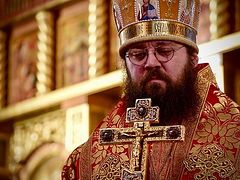
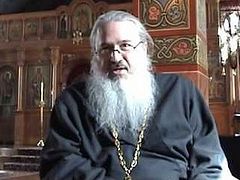
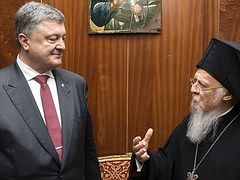
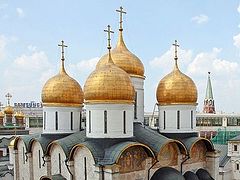
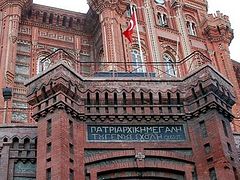
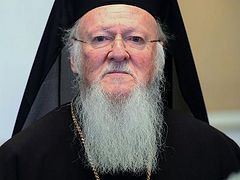
Bartholomew has ears, but he will not listen.
He has eyes but he will not see.